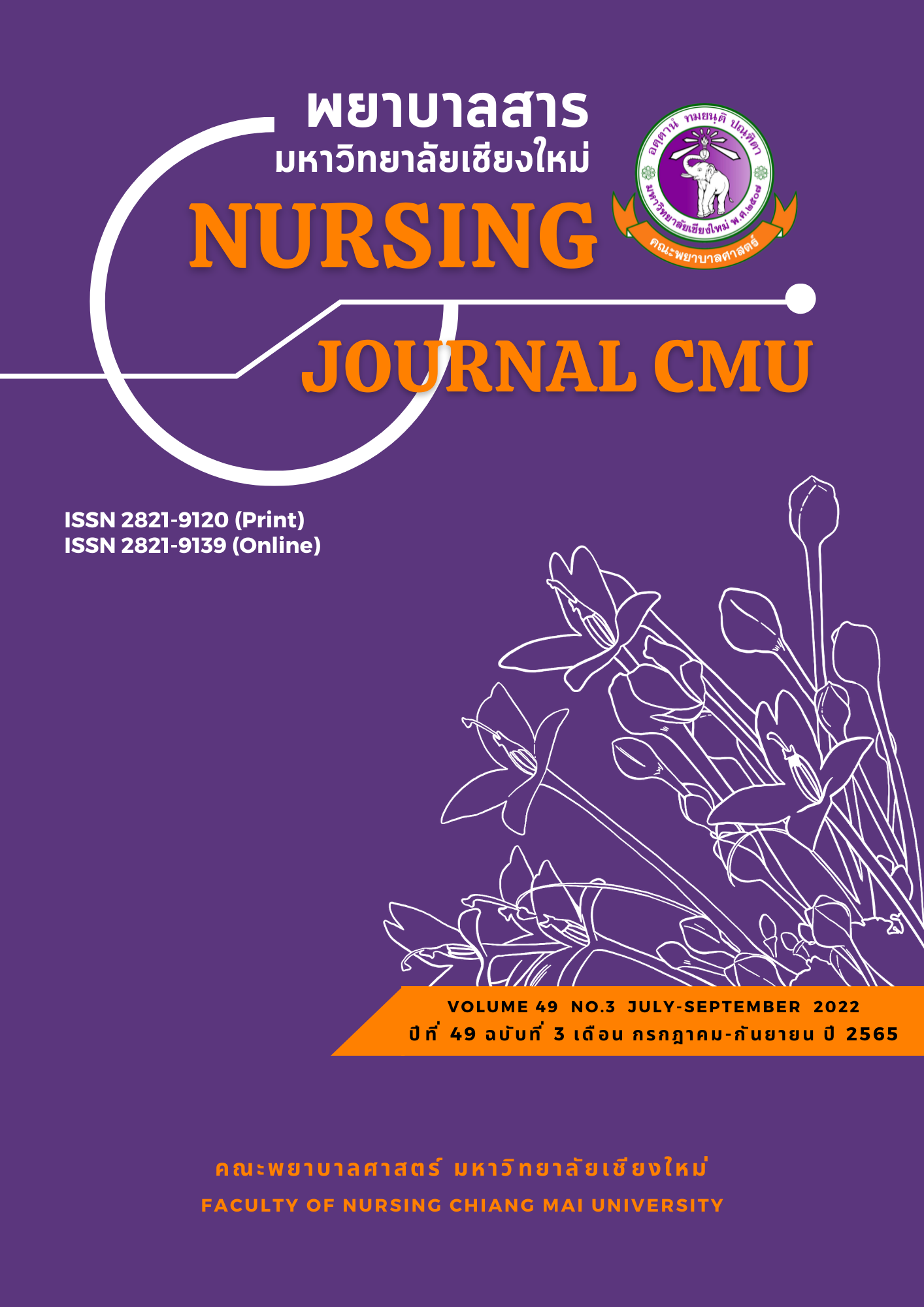Effect of PITS-Based Education on Health Literacy Among Older Persons with Type-2 Diabetes
Keywords:
Health literacy, Older persons with type-2 diabetes, PITS-based education programAbstract
For good disease control in older persons with diabetes, they need enhanced health literacy. This experimental research aims to examine the effect of a PITS-based education program on health literacy in older persons with type-2 diabetes. The 54 participants were selected by simple random sampling from older persons with type-2 diabetes attending the Health Promoting Hospital, Hang Dong District, Chiang Mai Province, and 27 participants were randomly assigned into either the control or experimental groups. The experimental group received the PITS-based education program, consisting of group and individual education, with 5 sessions for a duration of 3 weeks, while the control group received usual care. The experimental tool included the PITS-based education program for older persons with type-2 diabetes and data collection tools which consisted of a personal and illness data record form and the health literacy questionnaire for older persons with type-2 diabetes. Data were analyzed using descriptive statistics, independent t-test, Mann-Whitney U test, and Wilcoxon Signed Rank test.
The results showed that the mean health literacy scores of older persons with type-2 diabetes who received the PITS-based education program were significantly higher than those who received usual care (p < .001). After receiving education, participants had signifi- cantly higher mean health literacy scores than before (p < .01).
The results showed that education based on the PITS model can enhance health literacy. Therefore, the education program could be useful for health personnel to use as a guideline for enhancing older persons with type-2 diabetes to have better health literacy.
References
Aekplakorn, W. (Ed.). (2021). National health examination surveys (6th ed.). Nonthaburi: Augson Graphic and Design. (in Thai)
Auttama, N., & Seangpraw, K. (2019). Factors predictor health literacy among older adults with risk hypertension disease, Phayao province. Journal of Health Education, 42(2), 75-85. (in Thai)
Burns, N., & Grove, S. K. (2009). The practice of nursing research: Appraisal, synthesis and generation of evidence. (6th ed.). St. Louis, MO: Elsevier.
Baker, D. W. (2006). The meaning and the measure of health literacy. Journal of General Internal Medicine, 21(8), 878–883. doi.org/10.1111/j.1525-1497.2006.00540.x
Chentli, F., Azzoug, S., & Mahgoun, S. (2015). Diabetes mellitus in elderly. Indian Journal of Endocrinology and Metabolism, 19(6), 744-752.
Chiang Mai Province Public Health Office. (2018). Elderly screening form in community level [document file]. Retrieved from https://www.chiangmaihealth.go.th/cmpho _web/ document / 181112154199948456.doc
Cooray, B. P. R., Morrissey, H., Waidyarathnec, E. I., & Ball, P. A. (2018). The impact of individual health education on health literacy: Evaluation of the translated version (Sinhala) of health education impact questionnaire in type 2 diabetes. International Journal of Diabetes Research, 5(2), 1-8.
Department of medical services Ministry of Public Health. (2014). Guide for the elderly screening/assessment (2nd ed.). Nonthaburi: War Veterans Organization Office of Printing Mill. (in Thai)
Diabetes Association of Thailand under The Patronage of Her Royal Highness Princess Maha Chakri Sirindhorn. (2017). Clinical practice guideline for diabetes (2nd ed.). Pratumtani: Romyen Media company limited. (in Thai)
Edwards, M., Wood, F., Davies, M., & Edwards, A. (2012). The development of health literacy in patients with a long-term health condition: The health literacy pathway model. BMC public health, 12, 130. doi.org/10.1186/1471-2458-12-130.
Grossman, S. & Porth, M.C. (2014). Porth’s pathophysiology: Concepts of altered health states. Philadelphia: Lippincott Williams & Wilkins.
Ministry of Public Health. (2021). Diabetes rate in 2021. Retrieved from https:// hdcservice.moph.go.th/hdc/reports/report.php?source=formated/ncd.php&cat_ id6a1fdf282fd28180eed7d1cfe0155e11&id=cefa42b9223ec4d1969c5ce18d762 bdd (in Thai)
Noppakror, J., Chintanawat, R., & Khampolsiri, T. (2020). Health literacy and self-management in older persons with type 2 diabetes mellitus. Nursing Journal, 47(2), 251-261. (in Thai)
Nutbeam, D. (2000). Health literacy as a public health goal: A challenge for contemporary health education and communication strategies into the 21st century. Health Promotion International, 15(3), 259-267.
Nutbeam D. (2015). Defining, measuring and improving health literacy. Health Evaluation and Promotion, 42(4), 16-21.
Office of the Permanent Secretary Ministry of Public Health. (2020). Number and mortality rate in 2016-2019 [document file]. Retrieved from http://www.thaincd. com/2016/ mission/documents-detail.php?id=13893&tid=32&gid=1-020 (in Thai)
Pannark, P., Moolsart, S., & Kaewprom, C. (2017). The effectiveness of a program for health literacy development of the patients with uncontrolled type 2 diabetes at Bangwua district, Chachoengsao province. Nursing Journal of the Ministry of Public Health, 29(2), 91-106. (in Thai)
Sarin, S., Moolsart, S., & Chailimpamontree, W. (2019). The effectiveness of a health literacy development program in patients with type 2 diabetes risking to chronic kidney disease. Nursing Journal of the Ministry of Public Health, 29(2), 81-101. (in Thai)
Singhasem, P., Krinara, P., & Tiparat, W. (2019). Correlation between health literacy and health behaviors in older people: A survey research in a community, Trang province. Boromarajonani College of Nursing, Uttaradit Journal, 11(1), 37-51. (in Thai)
Sirikutjatuporn, K., Wirojratana, V., & Jitramontree, N. (2017). Factors predicting self-management behaviour of elderly type 2 diabetes patients. Thai Journal of Nursing Council, 32(1), 81-93. (in Thai)
Stewart, M. N. (2012). Practical patient literacy: The medagogy model. New York: McGraw-Hill Medical.
Suebpan, J., Boonyamalik, P., & Kerdmongkol, P. (2021). Effects of a health literacy promotion program on health behaviors in older adults with uncontrolled type 2 diabetes. Thai Red Cross Nursing Journal, 14(1), 109-124.
Downloads
Published
How to Cite
Issue
Section
License
Copyright (c) 2022 Nursing Journal

This work is licensed under a Creative Commons Attribution-NonCommercial-NoDerivatives 4.0 International License.
บทความที่ได้รับการตีพิมพ์เป็นลิขสิทธิ์ของวารสารพยาบาลสาร
ข้อความที่ปรากฏในบทความแต่ละเรื่องในวารสารวิชาการเล่มนี้เป็นความคิดเห็นส่วนตัวของผู้เขียนแต่ละท่านไม่เกี่ยวข้องกับมหาวิทยาลัยเชียงใหม่ และคณาจารย์ท่านอื่นๆในมหาวิทยาลัยฯ แต่อย่างใด ความรับผิดชอบองค์ประกอบทั้งหมดของบทความแต่ละเรื่องเป็นของผู้เขียนแต่ละท่าน หากมีความผิดพลาดใด ๆ ผู้เขียนแต่ละท่านจะรับผิดชอบบทความของตนเองแต่ผู้เดียว






